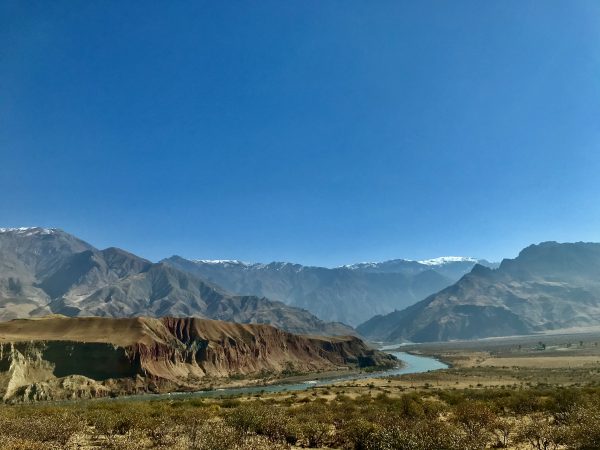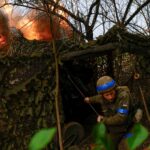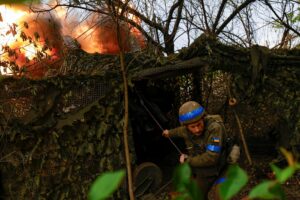Brussels, Berlin (23/5 – 62.5)
Tajikistan’s civil war came to an end in 1997 with a unique truce that saw the pro-Communist government integrating members of the opposition into various government institutions. Mamadbokir “Boqir” Mamadbokirov, a Pamiri leader from the Gorno-Badakshan region, was one of these opposition members. His story is a tragic one of indomitable courage in exposing what international observers have described as a state criminal enterprise created by president-for-life Imomali Rahmon, and a peaceful sacrifice if his life that he made on May 2022 that will likely be recalled in Pamiri lore for ages to come. Through previously unreported eyewitness accounts and public reporting, the story of one of Tajikistan’s modern heroes is finally emerging.
Boqir was a highly respected informal leader of the Pamiri people. He was born and raised in Khorog, the capital of the Gorno-Badakhshan autonomous region (GBAO), a vast mountainous area with only 2% of Tajikistan’s population, but that makes up 45% of the country. The Pamiri people, mostly Ismaili Shi’ites, had been granted autonomous political status by the Soviet Union due to their unique culture, languages, and minority religion. Following the peace treaty, the Pamiris, under the guidance of the Ismaili’s global religious leader, the Aga Khan, the Pamiris committed to building national unity, while the Aga Khan Development Network poured hundreds of millions of dollars in development aid into GBAO, launching schools, hospitals and clinics, and programs to protect the environment and create jobs, not only for Ismailis, but also in other regions of the country.

On May 22, 2022, Pamiri leader Boqir chose to give up his life so the regime would stop attacking his people. The Pamiris regard Boqir as their hero. Quoting his last words, strongly and with grim determination: “They cannot break us.”
Boqir was appointed by the government as a colonel in the Border Troops of the GKNB, Tajikistan’s state security service that was modeled on the Soviet KGB. He was responsible for securing the country’s borders with neighboring countries, including Afghanistan. However, events in 2006 plunged both Boqir and the Pamiris’ lives into a downward spiral of repression. The transfer of GBAO lands to China by the Rahmon regime, for the construction of a military outpost, caused popular outrage among Pamiris, and protests erupted against the central government. Col. Boqir publicly supported the protestors, a move considered disloyal to Rahmon, and a challenge to the regime’s efforts to control the GBAO.
That same year Col. Boqir and the men of his 21-07 Border Troop unit committed an unpardonable “crime” in the eyes of the regime: They seized a major shipment of heroin that regime-backed smugglers were moving from Afghanistan through Tajikistan to Russia. He also defended the honor a Pamiri woman whom his deputy and current governor of GBAO, Alisher Mirzanabatov, attempted to rape. These actions led to his firing by the GKNB, which then attempted to arrest Boqir at his home. The security services claimed that he was wanted on trumped up criminal charges, however locals stood their ground and forced the authorities to retreat and subsequently drop the fabricated accusations. This was a short-lived victory, as the regime began to escalate it repressive actions against the GBAO’s Ismaili Pamiris, and launched a concerted campaign, boosted by Pamiri turncoats loyal to the Rahmon regime, to vilify Boqir by painting him as a crime boss and dangerous drug lord.
In 2012, Rahmon ordered his security services and special forces to take control of the restive region. The bloody events of that summer led to the killings of 28 peaceful protestors. Pamiris then took up arms and forced the security forces to retreat in a humiliating defeat that the regime never forgot.
In November 2021, protests intensified following the brutal murder of Gulbiddin Ziyobekov, a local sportsman and youth leader. He was ambushed by GKNB officers, dragged across a footbridge, and tortured before being executed by gunshot. Photos of his mutilated body spread across Pamiri social media, shocking and enraging Pamiris in GBAO and the diaspora, especially in Russia.
After Ziyobekov’s murder, regime repression escalated, including cutting off local internet access, setting up police checkpoints throughout Khorog, positioning snipers, and intensively surveilling the wireline phone network. Security forces arbitrarily arrested Pamiris, brutally interrogating and torturing them to obtain false confessions and denunciations of fellow Pamiris, particularly local leaders like Boqir. In response, Pamiris organized civilian defense groups and neighborhood patrols.
The regime’s security chiefs publicly called for Boqir to surrender and escalated their charges against him and other local leaders, falsely accusing them of heading criminal enterprises. Boqir’s house and neighborhood were under 24/7 regime surveillance, including by drones. According to sources, Boqir only dared leave his house twice between November 2021 and May 2022. During the first trip, he accompanied his son to school but narrowly escaped injury or death when security forces opened fire on his car.
The situation in Tajikistan continued to escalate in May 2022. Pamiri civil activists planned a peaceful rally and protest in Khorog’s central square on May 14. While on their way to rally the protestors, they were surrounded by security forces who opened fire with rubber bullets and tear gas to disperse them. Three days later, civilians responded with further protests, peacefully resisting the security forces by blocking the Pamiri highway in Rushan district to prevent them from moving troops up the road to attack Khorog.
Ministry of Internal Affairs and GKNB forces under the orders of President Rahmon unleashed heavy gunfire on the protestors on May 18, killing 46 and arresting around 120 people. Survivors of the arrest described how detainees were brutally beaten, with some dying from torture. News reports citing local sources indicated that security forces deliberately executed some of the arrested Pamiris and sent their body parts to Boqir’s home. Several people close to Boqir said he felt personally responsible for the killings and was worried they would continue.
The numbers of dead in proportion to the Pamiris estimated population of 500,000 reveal the seismic impact of the killings on Pamiri society. The equivalent proportion of Chinese killed in one day would be 132,000, or 30,000 Americans, or 13,000 Russians. Survivors of the arrest described how detainees were brutally beaten, with some dying from torture.
On the night of May 21, according to a trusted source who wishes to remain anonymous in order to protect his identity and the safety of his family, Boqir received a telephone call from a senior security officer who issued an ultimatum: “Surrender now, or we will use all possible armed force to arrest you regardless of how many civilians attempt to defend you.” Later that night, Boqir’s home came under fire by snipers positioned in the mountain slopes above his neighborhood.
The next day, Sunday, May 22, followers of Boqir were gathered around his house in order to attempt to protect him from any moves by the security forces to move against him. To their surprise they saw him silently exit his door with a stoic look on his face. He did not respond to greetings called out to him but did stop briefly to politely inquire how some of his comrades were holding up. As he turned to walk towards the street, he spoke his last words, strongly and with grim determination: “They can’t break us.”
According to a witness who approached Boqir, the colonel’s phone rang and when he answered an unidentified individual was heard taunting and threatening Boqir, saying, “If you are a man, then come to the Boyni neighborhood and let’s meet.” Other witnesses report that numerous surveillance drones were in the skies above Khorog that day. Boqir began to calmly walk towards Boyni, seeming not to notice the growing crowd of persons following him concerned for his security and wanting to see where he was going and. Suddenly, a pickup truck roared around the corner, screeching to a stop in front of Boqir, and four GKNB Alpha unit commandos jumped onto the street with their guns raised.
The alarmed crowd began scattering in fright, leaving Boqir and a young follower alone on the street. An Alpha commando took aim at Boqir striking him in the stomach. Boqir’s young follower rushed to protect him and was shot in the arm. The two men crumpled to the ground. A GKNB commando then executed Boqir with a shot to the head. The commandos quickly fled the scene.
Bystanders then rushed to Boqir’s side, but it was too late. The car bringing his body back to his home came under sniper fire, but once inside his family and friends began all the obligatory Islamic rituals to prepare him for burial. Despite government orders prohibiting any public funeral, hundreds of Pamiris gathered to accompany Col. Boqir’s body to his burial site, where funeral prayers were led by the respected Pamiri religious leader, khalifa Muzaffar Davlatmirov.
Three weeks later, on 12 June, two other informal leaders of the Pamiri community Zoir Rajabov and Khursand Mazarov, were executed by Tajik security forces during a raid on one of their homes. Accusing them of being leaders of a “criminal gang,” the authorities published a photo of their bodies splayed on the floor of a living room. Khalifa Davlatmirov at great personal risk also led the funeral services for these leaders. On 26 July, the cleric was arrested by the authorities and in a show trial a week later was charged with the crime of “publicly calling for extremist activity using the mass media and internet.” He was sentenced to five years and taken to the infamous YaS 3/6 prison in Yavan.















